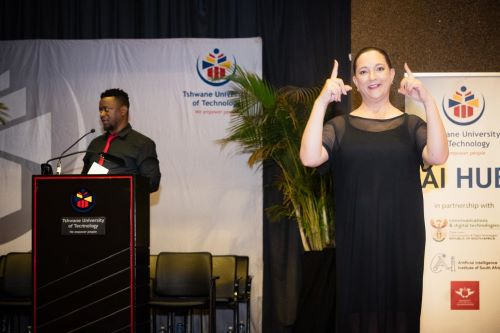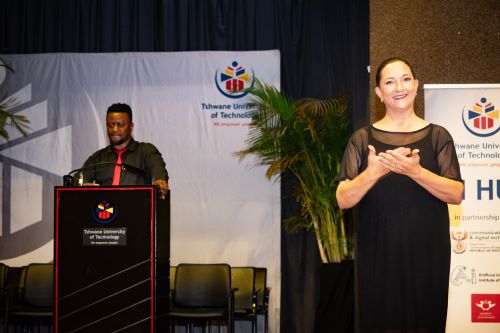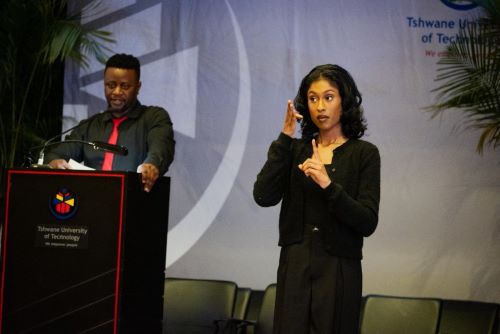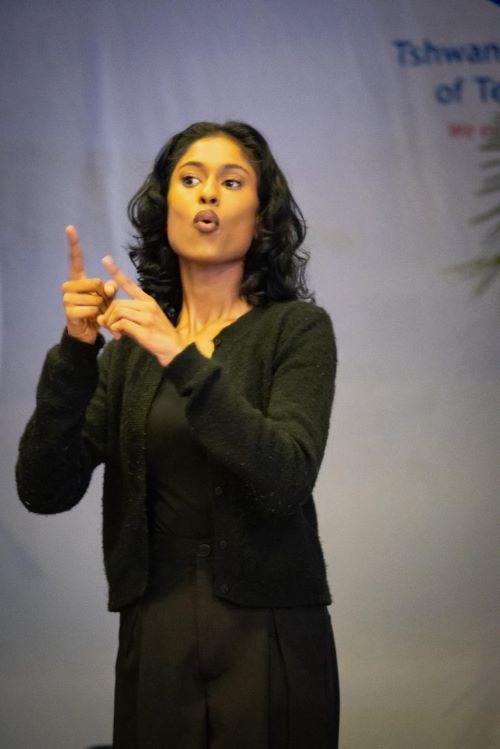by Willa de Ruyter Kaempffer
The Tshwane University of Technology (TUT) broke new ground when it introduced sign language interpreting at its graduation ceremonies on 15 and 16 October 2025, ensuring that students and guests who are deaf or hard of hearing could fully participate in one of the University’s most prestigious events.
Delivering the keynote address on behalf of the Vice-Chancellor, Acting Deputy Vice-Chancellor Digital Transformation, Dr Emily Mabote said: “The Tshwane University of Technology is appreciative of the stony road that many of our students have trod on the journey towards this graduation day. We are aware of the many rivers crossed; the mountains scaled, and the hurdles overcome by each of those whom we celebrate today. Across the higher education sector, TUT students are deservedly known for being feisty and resilient.”
Why is the introduction of sign language interpreting important
Prof Tebogo Rakgogo, Associate Professor and HoD of the Department of Applied Languages, Faculty of Humanities, explained why the inclusion of sign language interpreting at Graduation ceremonies is an important step in embracing the constitutional rights of all students.
“Including sign language interpreting at our graduation ceremonies is a concrete and highly visible step toward inclusion. It recognises that language is not just a means of communication, but a form of respect, a form of affirmation,” he said.
“South African Sign Language (SASL) became the country’s 12th official language in July 2023, following the Eighteenth Constitutional Amendment. The recognition formalised SASL’s inclusion in the Constitution under Section 6, promoting the rights of persons who are deaf or hard of hearing to equal access to information, dignity and human equality,” he added.
Preparing students for inclusive, future-ready workplaces
Dr Mumthaz Banoobhai, Senior Director for Higher Education Development Support, added to Prof Rakgoga’s comments, saying the use of sign language interpreting during TUT’s annual Graduation Ceremonies is long overdue. She continued that this has been made possible by the Ammendment to the Higher Education (HE) Act of 1997 with the DHET Language Policy Framework for Post School Education (2022), the review and approval of the TUT Policy of Language and DHET funding for the implementation of the TUT Language Plan.
According to her, soft skills like effective communication, empathy and accessibility are becoming more and more important in today’s global economy and increasingly diverse work environments.
Dr Banoobhai explained: “For students who are deaf or hard of hearing, access to sign language interpretation builds confidence, removes barriers and ensures their education is fully inclusive. Employers in many sectors nowadays look for graduates who understand inclusivity and accessibility not as an afterthought, but as essential components of good practice.”
She added that, equally, for hearing students and community members, witnessing sign language interpretation at a major event like graduation cultivates awareness, compassion and inclusivity. “It helps build a society where diverse ways of communicating are valued, where everyone has an opportunity to be heard,” she said.
Prof Rakgogo commended TUT’s decision to include sign language interpretation at its October graduation ceremonies, saying it is more than a symbolic gesture. “It is an actionable step in promoting equity, in honouring the perseverance of all students and in fulfilling both the letter and spirit of South Africa’s laws and values.”
As we celebrated our graduates on 15 and 16 October, their stories of endurance and success will be accessible to even more people and this is one way how institutions like TUT become catalysts for a more inclusive future.




TUT broke new ground with the introduction of sign language interpreting during the spring Graduations in 2025.
